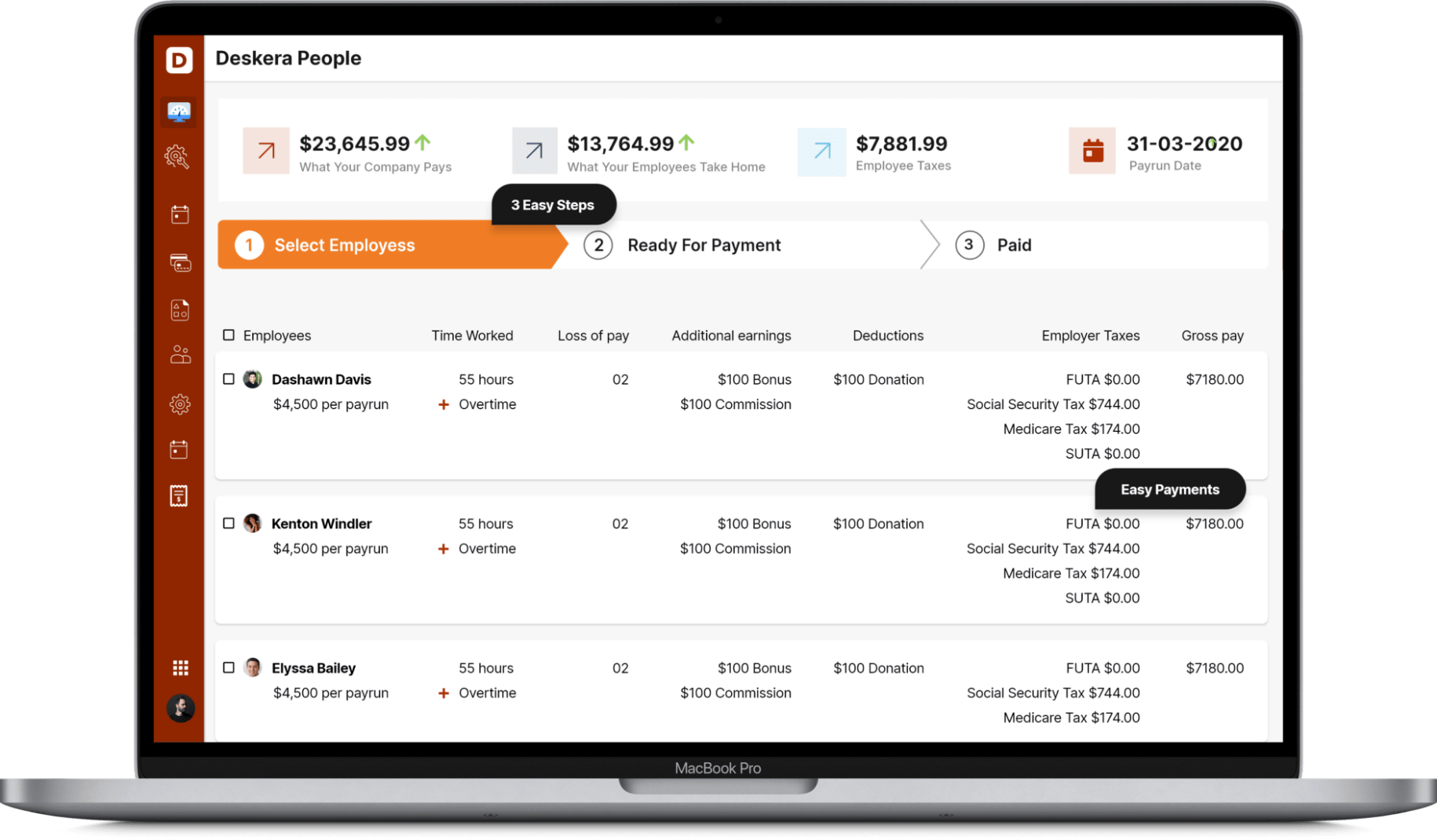Payroll is a troublesome aspect of any business, and many entrepreneurs express dissatisfaction with organizing their payroll papers. However, payroll is essential. Not only is it critical that you pay your workers accurately, but making a payroll error is unpleasant, complex, and may result in tax consequences.
In Vermont, payroll processing is quite simple. But, because of the state's progressive tax system, calculating payroll tax can be difficult. Otherwise, the state largely adheres to federal regulations.
So, if you're searching for a short and easy-to-understand introduction to payroll, you've come to the correct spot.
Table of Content:
- Vermont Payroll Laws, Taxes & Regulations
- Vermont State Taxes
- Income Taxes
- Employer Unemployment Taxes
- Workers' Compensation
- Vermont Minimum Wage Laws
- Vermont Overtime Provisions
- How to Pay Payroll Taxes in Vermont?
- Paying Employees
- Bottom Line
Let's start!
Vermont Payroll Laws, Taxes & Regulations
Payroll management entails more than just paying workers for their time. It also entails calculating Vermont payroll taxes and following all the provincial and federal labor rules. Examine Vermont's applicable laws below to help you stay in line with payroll requirements.
With a few caveats, most businesses in the United States need to pay FICA taxes. The FICA tax rate for Social Welfare is 6.2 percent, while the Medicare taxation is 1.45 percent. Both the business and the worker will be responsible for these expenditures, contributing 7.65% of the overall Social Security and Medicare payments.
Vermont payroll taxes have three elements:
Vermont State Taxes
Vermont, like other states, has a set of taxes that employers must pay and withhold from employees' paychecks. However, employees in Vermont are not subject to municipal taxes.
Income Taxes
Vermont has a progressive tax. Taxes have four different rates (ranging from 3.35 percent to 8.75 percent), and income amounts vary depending on the method of filing by the employee. If you're handling payroll by hand and need to figure out how much you need to withhold for each employee, the State of Vermont's withholding tax guide can help.
Employer Unemployment Taxes
All companies need to file State Unemployment Tax Act taxes. The current salary base is $14,100, with rates ranging from 0% to 8.4%. The majority of new Vermont firms will pay a SUTA rate of 1.0 percent. Businesses that pay SUTA in full and on time are eligible for a 5.4 percent tax credit on their FUTA taxes.
Workers' Compensation
Every employer in Vermont with one or more employees needs to have workers' compensation insurance. Workers' insurance compensates injured employees by covering the costs of medical care and lost pay. In addition, you can opt to get pay-as-you-go insurance, which calculates your workers' compensation payable based on your current payroll levels; this ensures you don't have to play catch-up at the end of the year.
Vermont Minimum Wage Laws
Vermont's minimum wage is greater than the federal standard of $7.25 per hour. As a result, all firms in Vermont need to pay their employees at least $11.75 per hour. In addition, companies must pay at least $5.88 per hour to tipped workers if their tips bring them to the hourly minimum wage. Otherwise, the corporation must make up the difference.
Vermont Overtime Provisions
The overtime restrictions in Vermont follow the FLSA. All companies are required under the FLSA to pay employees 1.5 times their usual hourly salary for hours worked more than 40 in a workweek.
How to Pay Payroll Taxes in Vermont?
Here's a quick primer on how to conduct payroll in Vermont.
Step-1: Establish your company as an employer.
New businesses need to use the federal Electronic Federal Tax Payment System (EFTPS) to get the latest Federal Employer Identification Number (FEIN). To file federal taxes, you must have your FEIN.
Step-2: File a business registration with the state of Vermont.
When starting a new firm, you must register on the Vermont Secretary of State's portal. The Vermont Department of Commerce runs the website. Additionally, any firm that pays workers in Vermont needs to enroll with the State Tax Commission.
Step-3: Design your payroll procedure.
If your company is new, you must create a payroll process from the ground up. You'll need to establish when and how often you'll pay staff and what payment options you'll provide.
Step-4: Have staff complete the necessary forms.
During the onboarding process, you must have each employee complete payroll documents. In addition, every employee is required to undergo I-9 verification. New workers must also have a completed W-4 and, if applicable, direct deposit authorization on file.
Step-5: Go over timesheets and approve them.
You must collect timesheets many days in advance to conduct payroll correctly. Reviewing your nonexempt workers' timesheets allows you to talk with anyone if they have made a mistake.
Step-6: Determine the employee's gross compensation and taxes.
We do not suggest calculating Vermont payroll taxes by hand. Tax computations can get complicated, and even minor errors can lead to heavy fines. However, you may use payroll software, a calculator, or even Excel to perform basic calculations.
Step-7: Pay employee salaries, benefits, and taxes.
Direct transfer is the best method of paying your staff. However, cash and paper cheques are also viable possibilities. If you use a service like Deskera, the firm should work with you to ensure simple, automated, and digital deductions.
Step-8: Make a backup of your payroll records.
Keeping business documents for your organization is a wise habit. For example, businesses in Vermont need to retain a record of all hours worked and earnings paid to each employee for at least three years, including their name, address, and date of birth.
Step-9: Submit payroll tax returns to the federal and state governments.
You must pay all the Vermont state taxes to the appropriate state agency on the due date. The due date is quarterly and can be done online at the Vermont State Tax Commission website. You can pay federal taxes online using the EFTPS on a semi-weekly or monthly schedule.
Step-10: Finish your year-end payroll reports.
Payroll in Vermont entails more than merely paying employees regularly. Every year, you must file payroll reports, which contain all W-2 forms and 1099 forms. You must distribute these forms to workers by January 31 of the following year.
Paying Employees
Workers must be paid every week under Vermont law. However, you can alter the schedule to twice a month if you tell them in advance. If your firm pays less frequently than once per week, you should add this notification in your company handbook so that all new workers are aware of the payment schedule. Employers must pay wages within six days after the pay month, regardless of the payment schedule.
Vermont also permits you to pay employees in:
- Cash.
- Paper.
- Direct deposit after written notice.
- Payroll card, only if permitted in writing by the employee.
Bottom Line
Vermont has a progressive state tax, but there are no local taxes. It has only one state payroll document and typically adheres to federal employment rules. While it is not the smoothest state to operate payroll in, it is far from the most challenging.
How Can Deskera Assist You?
Deskera People make it simple to handle leave, attendance, payroll, and other processes so that you can focus on growing your business. For example, creating payslips for your employees is now simple since the platform also automates and digitizes HR tasks.
Deskera People provides all the employee's essential information at a glance with the employee grid. With sorting options embedded in each column of the grid, it is easier to get the information you want.

Frequently Asked Questions
What are the Child Labor Laws in Vermont?
Vermont, like federal regulations, does not limit the employment hours or days of youth aged 16 and 17. Minors under the age of 16 who want to work, on the other hand, must get an Employment Certificate.
These working children are not permitted to work more than three hours each school day or 18 hours per week, and they can not work before or after 7 a.m. or after 7 p.m.
They can not work more than eight hours every non-school day or more than forty hours per non-school week. Children aged 14 and 15 can not work more than six days a week, irrespective of whether the school is in the term.
Do I need to file Form W-4?
Form W-4VT is the only payroll form used in Vermont. Moreover, it is the state equivalent of the federal W-4 form.
What are the requirements for Vermont New Hire Reporting?
Every company in Vermont needs to report new hires and rehires to the Vermont Department of Workforce Services within 20 days of the employee's first day of work. This information, which must contain the employee's name, address, and Social Security number, is used to enforce child support obligations.
Key Takeaways
- Payroll in Vermont is more complicated than in many other states. Vermont has a progressive tax, making calculating the withholding amount from employee paychecks hard.
- Payroll in Vermont necessitates the calculation of Vermont payroll taxes and adherence to all federal and state employment rules.
- Most employers in the United States need to pay FICA taxes. The current FICA tax rate for Social Security is 6.2 percent, while the Medicare tax rate is 1.45 percent.
- There are three main components of Vermont Payroll Taxes:
- Vermont State Taxes.
- Income Taxes
- State Employer Unemployment Taxes (SUTA)
- Every Vermont business with one or more workers needs to have workers' compensation coverage. The average price is around 78 cents for $100 of payroll processed.
- Vermont's minimum wage is $11.75/hour.
- The overtime regulations in Vermont work on the FLSA, which requires all companies to pay employees 1.5 times their usual hourly salary for hours worked more than 40 in a workweek.
- How to Do Payroll Taxes in Vermont:
- Establish your company as an employer.
- File a business registration with the state of Vermont.
- Design your payroll procedure.
- Have staff complete the necessary forms.
- Go over timesheets and approve them.
- Determine the employee's gross compensation and taxes.
- Pay employee salaries, benefits, and taxes.
- Make a backup of your payroll records.
- Submit payroll tax returns to the state government and federal.
- Finish your year-end payroll reports.
- Workers must be paid every week under Vermont law. You can change the frequency to twice a month if you tell them in advance.
- The state of Vermont has a progressive income tax and no local taxes
Related Articles











